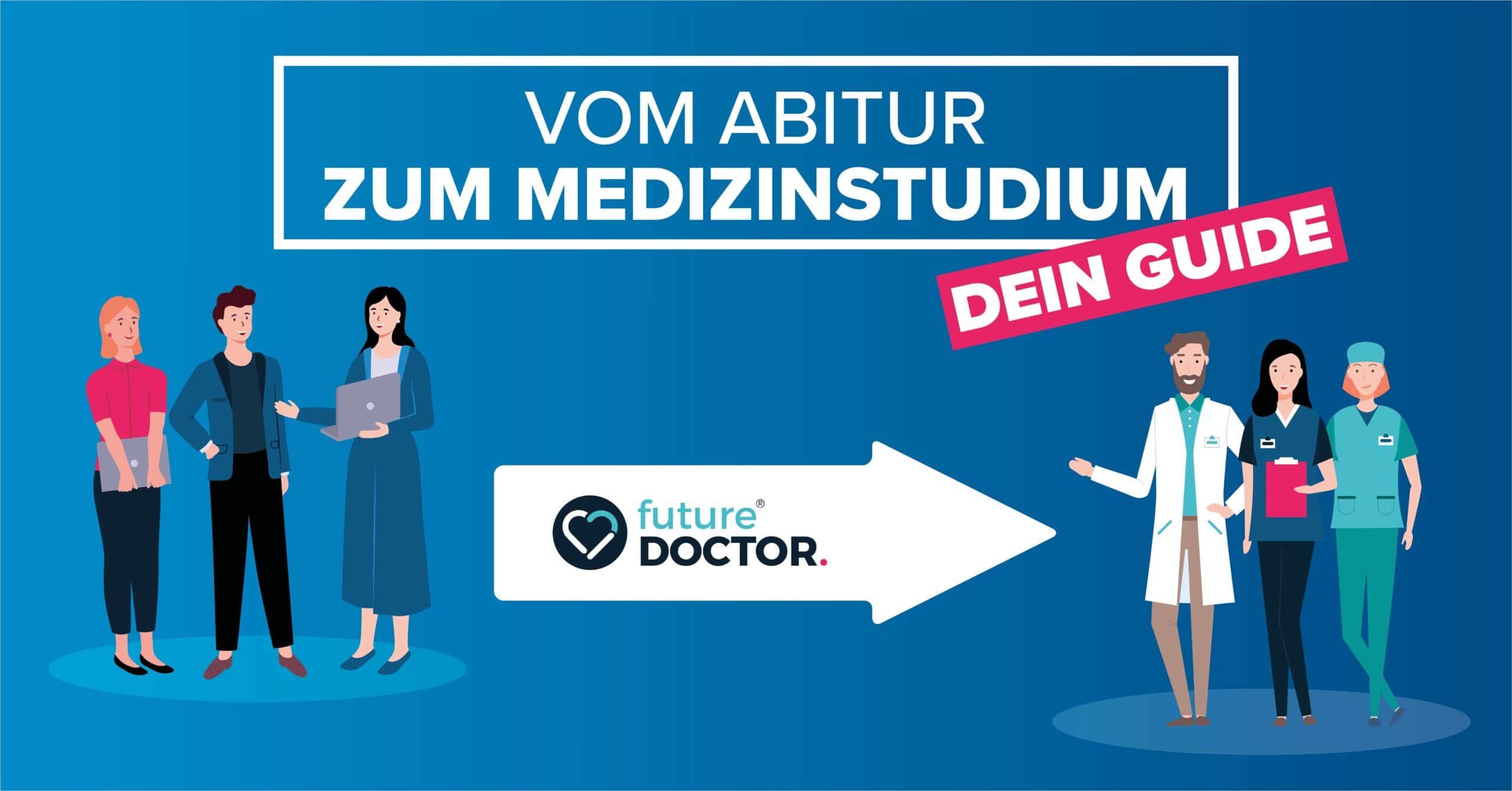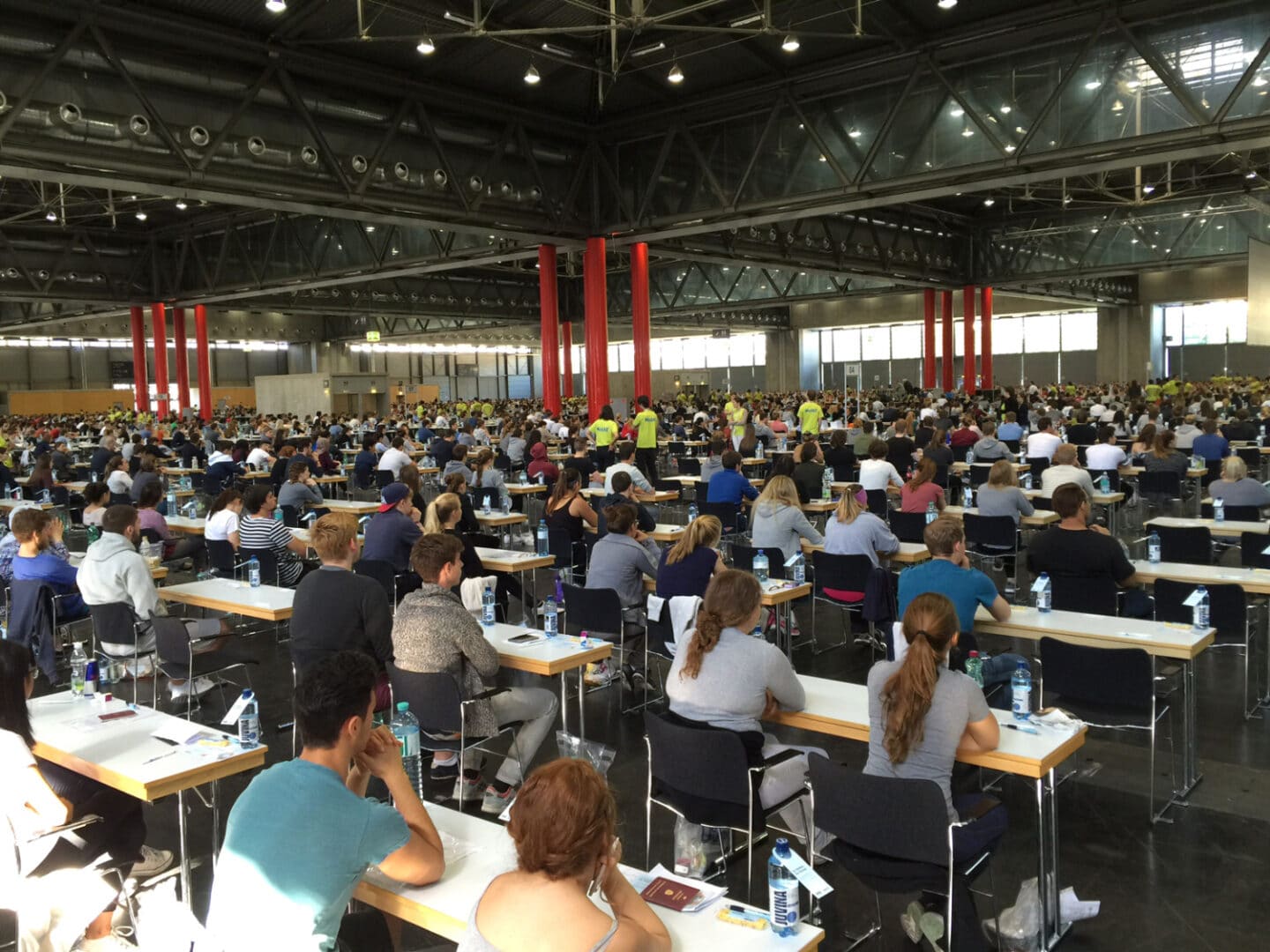
📖 Table of contents
Passing the Abitur and now fulfilling the dream of studying medicine - if only it were really that easy. In Germany, the path from leaving school to the start of the medical degree programme is fraught with hurdles.
"Is my A-level grade good enough? What is this year's N.C. quota at University X? What can I do to improve my chances of getting an Medical study place to increase? Will I ever Study medicine can, if so, when?" - These are just some of the questions that prospective students interested in studying medicine in Germany have to deal with.
Studying medicine is not a decision that should be made on a whim. Studying medicine can not only change your life, but also the lives of many others. It usually takes 5 years to study dentistry and 6 years to study human medicine, but it can of course take longer.
It is therefore all the more important to familiarise yourself with and understand the whole issue. If you don't get a place at university this year, it is extremely important to plan well for the next opportunity in order to increase your chances and bridge your time until then.
This is exactly what this blog is about. We'll explain how the process of studying medicine works, what resources you can use to help you plan better, what you can do to bridge the gap until your next attempt and what alternatives there are to studying medicine in Germany WITHOUT a degree. NC gives.
1. graduated from high school - how do I get to study medicine in Germany?
Anyone wishing to apply for a place to study medicine or dentistry at a state university in Germany must first register on the application and information portal "hochschulstart.de" to register. This is divided into the following steps: Registration in the DoSV application portal, followed by an application via the "AntOn" application tool. The deadlines (cut-off period) vary depending not only on whether you are applying for the winter or summer semester, but also on whether you are an old or new high school graduate. The allocation of study places is largely based on the NC principle.
You can find the current deadlines here.
2. what is the N.C.?
N.C. is the abbreviation for Numerus Clausus and comes from Latin. Translated, the term means "limited number". In Germany, the N.C. expresses the grade point average in relation to colleges and universities.
3 When is the numerus clausus applied?
If the demand for study places exceeds the supply, universities can apply for an admission restriction. However, medical degree programmes in Germany are generally considered to have restricted admissions nationwide. According to "Hochschulstart", there were 49,885 applicants for 9,660 admissions in the 2020 winter semester alone.
The criteria used to restrict admission depend on the federal state and the respective university. The numerus clausus is calculated based on the number of applicants, the average A-level grades achieved and the number of available study places.
In this case, the Numerus Clausus expresses the average grade of the most recently admitted applicant.
A simplified example: If the N.C. is 1.2, for example, applicants with an average grade of 1.2 or better will be admitted to the degree programme. The numerus clausus changes every semester and is therefore difficult to predict. However, in order to be able to prepare and have an idea of the range of the N.C. at the respective universities in Germany, apps such as the NCRECHNERremedy. We will explain in more detail how the app can help you in the course of the blog.
4. what criteria must I fulfil in order to be eligible for a place to study medicine in Germany?
The last major changes to the admission criteria for studying medicine in Germany were only made in 2020. Currently, admissions are awarded on the basis of three main quotas, although a preliminary quota of 20% is applied in advance. These 20% of available study places are allocated in advance to hardship cases, students from abroad and second degree applicants, among others.
Applicants who are not affected by the preliminary quota automatically take part in all three main quotas. The main quotas differ not only in their respective criteria, but also from university to university.
The following quotas are taken into account:
- Best Abitur quota 30%
As the name suggests, this is a criterion that is dependent on A-level grades. Of the available study places, 30% are awarded to the best A-level students, depending on the total number of points achieved.
If the Abitur did not go so well after all, there is still a chance of gaining a place to study medicine via the ZEQ and the AdH.
- Additional suitability quota 10% (ZEQ)
Only criteria independent of school grades are used for the ZEQ. The exact criteria depend on the university and are weighted on an individual 100-point scale.
Points can be awarded for study aptitude tests (TMS/HAM-NAT), education, professional activity, service, voluntary work, recognised prizes and personal selection interviews.
- University selection procedure 60% (AdH)
The majority of study places are reserved for the university selection procedure. In addition to the Abitur grade, at least two school grade-independent criteria and a subject-specific aptitude test (TMS/HAM-NAT) must be taken into account in the AdH. An individual 100-point scale is also used here.
Please note that your performance will be compared directly with that of the other applicants, resulting in a ranking list. A 1.0 average is therefore not a 100% guarantee of gaining a place to study medicine in Germany, e.g. there may be enough applicants with a 1.0 average and a better Abitur score.
5. what is the N.C. calculator?
NCRECHNER is an app that allows you to easily and simply calculate whether, how and at which university in Germany you would have got a place to study medicine in the last two semesters. Apps like this can help you to have a guideline of what requirements you would have to fulfil at the respective universities and you can prepare accordingly. It is important to mention here that this information can only be used to make an assumption and not a prediction for the expected numerus clausus for the next round of applicants. Nevertheless, a recurring pattern can often be observed.
The most important functions of the app are the "DreamOn" and the evaluation of the data entered. In the "DreamOn" you can enter data such as your A-level results, education, TMS/HAM-NAT, work experience, waiting semesters, etc. As soon as the app has all the required data, a probability table appears with the universities to which an application would have been successful in the last two semesters.
You can get a more detailed overview in the "Evaluation" tab. Here you can see once again whether and to which university you could have successfully applied or what would have been missing and what options there are to improve your chances.
The app tells you everything you need to know about the impact a service, FSJ, TMS/HAM-NAT etc. at a particular university would have on the individual quotas and therefore on your chances of getting a place at medical school.
The app is available in the Google Play Store and in the AppStore.
6. what can I do to increase my chances of getting a place to study medicine in Germany?
If you are currently still at schoolthen please be advised: INFORM YOURSELF EARLY about all current deadlines (TMSapplication, upload etc.) and requirements. At the end of the day, you are responsible for your medical school place in Germany. With apps like NCRECHNER, you can easily get an idea of what A-level average and other criteria you would have had to fulfil in order to get a place in the last two application rounds.
But even as an old high school graduate, the first step towards studying medicine is to inform yourself. Always stay up to date, because you never know when the admission requirements will change.
To increase your chances of gaining a place to study medicine via the ZEQ and the AdH, you should consider the following options for bridging your time:
- Increase your chances of getting into medical school with: TMS/HAM-NAT
A very good "medicine test" can compensate for an insufficient A-level grade. Of course, this depends on the criteria of the respective university.
Please note: The HAM-NAT is only recognised at the universities in Hamburg and Magdeburg.
- Increase your chances of a place at medical school through: Vocational training
Bridge your time and prepare yourself with practical experience instead of just theory. Training as an emergency paramedic to bridge the gap to medical studies is particularly popular among applicants. You can find out which other vocational training/professional activities are currently recognised at Hochschulstart.de
Please note: Only professional activities with a minimum duration of 12 months will be considered.
- Increase your chances of getting into medical school: FSJ and voluntary work
Complete a voluntary service of at least 2 years (e.g. Johanniter, ASB, DRK, etc.) or an FSJ of at least 11 months.
Any additional recognised achievement that you perform can give you priority in the event of a tie with an applicant who has the same Abitur score as you!
7. what other options do I have to bridge the gap until I can study medicine?
A popular option chosen by many who are not yet sure whether they really want to study medicine or simply want to bridge the gap is to study natural sciences in biology or chemistry. Studying these subjects can prepare you for medical school in many ways, especially when it comes to understanding medical topics.
8. are there alternatives with which I can start my medical studies without complications and WITHOUT an NC? And what advantages do they offer me?
Studying abroad is the easiest way to study medicine without an NC. This option is becoming more and more popular due to the high demand and insufficient supply of medical study places in Germany. For many students this means Studying medicine abroadliving independently and without parents for the first time. You gain unique experiences, friends and moments that you would never have had if you hadn't decided to study medicine abroad.
Among other things, the Medical studies in Austria. The medicine entrance test used in Austria is a procedure that is independent of school grades. However, this test is not the easiest and the quota for European applicants is only 20%.
Another option would be to study medicine in other European countries, where the admission procedure is somewhat simpler. There are also no quotas based on the origin of the applicant in the international degree programmes at these universities. This means that the competition is fair for everyone.
The admission procedure also varies from university to university. At these 18 top universities in Europe However, a distinction can be made between application processes with and without an entrance test. At universities without an entrance test, places are generally allocated on the basis of academic performance and additional extracurricular activities (FSJ, service, etc.), similar to Germany. Nevertheless, the chances of gaining a place abroad are generally higher than in Germany.
Studying medicine abroad is associated with additional costs, but if the worst comes to the worst, it saves you a few years of waiting for a study place in Germany, which will hopefully pay off.
Would you like to find out more about alternatives to studying medicine in Germany without an NC? Order a free information pack or arrange a free consultation, Telephone information calland have all your questions answered.
To summarise, the application process for studying medicine in Germany can seem extremely complicated at first glance. Therefore, the most important thing, especially if you are about to graduate from high school, is to inform yourself and be aware of what you need to achieve in order to save yourself the agony of a lengthy application process. If your A-levels are not as good as you had hoped, you will have to perform well in order to fulfil the numerus clausus. Unfortunately, it is not uncommon for the achievements accumulated over the years to still not be enough in the end.
Blogs on this topic, such as this one, are often informative enough, but we would like to emphasise once again that changes can occur quickly and it is therefore the responsibility of each person to make themselves aware of the official sites.
If you are aware that you cannot fulfil the requirements of the N.C. in Germany, you should look for a Plan B so as not to fall into the process of hoping and waiting over the next few years. Studying medicine abroad can be the most uncomplicated solution in such a case. Save valuable time, increase your chances of getting a place at medical school and fulfil your dream of studying medicine.
Don't have a plan B yet? Order a free information pack now and find out about possible alternatives to studying medicine in Germany.





